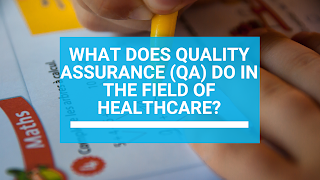What does Quality Assurance (QA) do in the field of healthcare?
To have a QA prog ram to be able to efficiently manage all the processes and technologies in this sector and to continuously monitor the high-quality of the processes it is crucial to ensure that every aspect involved in Total Quality Management (TQM) is addressed. Let's look at the ways that QA can offer healthcare organizations.
Big Data Quality Measures
As per Gartner, "Reliable, trustworthy and easily accessible data is essential for any healthcare institution's capability to effectively orchestrate and pay for healthcare conduct research, provide value to the growing healthcare industry, and to avoid another COVID-like disruption and get the most value in AI investment." In the face of the incredibly huge amounts of data that are poured into every hour for any company, it is essential to be able to analyze the data to identify patterns or associations and then provide the appropriate assistance to ensure the most relevant healthcare for patients. A QA software can help put these procedures, techniques, algorithms and business intelligence into review to ensure that only the highest quality standards are offered to healthcare workers , so that they are able to make informed choices.
Security
Many software programs are integrated to share patient data across numerous networks. Security can be affected when patient data is shared among hundreds of providers who might not meet the standards of compliance that you are able to achieve in your infrastructure. Stringent government and regulatory bodies rules, in addition to increasing demands for healthcare, require an acute concentration on data and software security. A QA program can ensure that the data and software are secure from beginning to end, without violating any protocol set by the regulator.
Integration Testing
Healthcare applications provide feedback and extract the latest information to different forms and modules in different applications within the same organisation. Integration testing should be conducted to ensure that the entire healthcare web-based application and its associated devices are connected and functioning as per specifications.
Functional Testing
When it comes to healthcare software and integration with applications it is crucial to ensure that the software is functionally sufficient to offer the performance and services required. Think about a hospital app that allows patients to customize their care reports. The app must function and should always keep all the information up-to-date to provide the exact service.
Testing the functionality of these integrated software applications allows testing workflows and processes by taking performance measurements throughout the process to ensure that the results you want are true and 100% precise. This is achieved by measuring the output, implementation and the execution of each parameter. Thus, functional testing aids in ensuring the best quality output with shorter development times. Quality Assurance further ensures comprehensive coverage of all the possible settings and scenarios that aids in achieving end-to-end tests.
A robust and sustainable QA program that is scalable across all departments is considered a must for any healthcare company to expand. The QA strategy for implementation begins by establishing proper culture, and mentality to ensure the highest quality in each deliverable.
If you’re looking to outsource your software testing requirements, then you are in the right place. TFT offers a range of software testing services that ensures your software or website is ready to go live on a million devices without any glitch or error.




Comments
Post a Comment